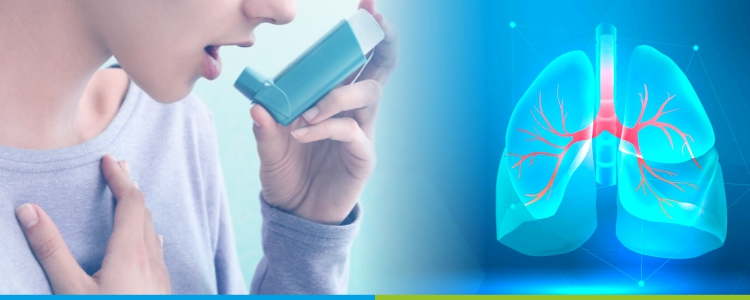All About Asthma

Asthma is a chronic lung disease that affects children & adults. This disease affects your airways, which transport air to and from your lungs. The airways in your lungs can become inflamed and narrowed if you have asthma. It may cause wheezing, coughing, and tightness in the chest. A flare-up or asthma attack occurs when these symptoms worsen than usual.
Impact
A person with untreated asthma can suffer from sleep disturbances, fatigue during the day, and poor concentration. Besides missing school and work, people living with asthma and their families may face economic hardship. A person with asthma may require emergency medical care and may be admitted to the hospital for treatment and monitoring if their symptoms are severe. Asthma can even result in death in the most severe cases.
Causes
There is no known cause of asthma. People with asthma are likely influenced by genetics and their environment. Asthma attacks can occur when exposed to asthma triggers. Asthma triggers are things that can start or worsen asthma symptoms. There are different triggers for different asthma:
- Pollen, dust mites, mold spores, pet dander, or cockroach waste are among airborne allergens
- Breathing problems or infections of the lungs
- Because of physical activity.
- A cold climate
- Exposure to pollution and irritants, such as smoke
- Several medications
- Powerful emotions and stress
- The presence of sulphites and preservatives in some foods and beverages
- Acids from your stomach back up into your throat when you have gastroesophageal reflux disease (GERD)
Symptoms
- Tightness in the chest accompanied by coughing, particularly at night or early in the morning
- Breathing problems
- When you exhale, whistling is heard because of wheezing
There is a wide range of severity of these symptoms. Some people experience these symptoms every day, while others do so rarely. Your symptoms get much worse during an asthma attack. It may be gradual or sudden. It may even be life-threatening. People with severe asthma are more likely to suffer from them. Changing your asthma treatment may be necessary if you are experiencing asthma attacks.
See your doctor immediately if you experience any of these symptoms
- Breathing rapidly
- Pale lips, pale nails, or pale skin
- As you breathe in, the skin around your rib cage pulls inward
- Making it difficult to breathe, walk, or talk
- Even after you take medications, these symptoms don’t go away
Classification of Asthma
- Mild and intermittent asthma- The symptoms appear once or twice a week. Symptoms at night do not occur very often. Asthma attacks are rare.
- Mild and persistent asthma- Symptoms occur three to six times per week. Symptoms at night occur three to four times per month. Asthma attacks might interfere with daily activities.
- Persistent moderate asthma- Asthma symptoms every day. Five or more night-time attacks per month. The symptoms may limit activities.
- Persistent severe asthma- Both daytime and night-time symptoms. Activities are limited.
Risk factors
All ages are at risk for asthma, but childhood asthma is the most common. Factors that can increase your risk include:
- Second-hand smoke exposure during pregnancy or as a young child
- Working with chemical irritants or dust at work
- Genetics and family history. It’s more likely that you will develop asthma if your mother or father has the disease.
- Compared to people from other races or ethnicities, black and African American and Puerto Rican people are more likely to have asthma.
- Having obesity and allergies may also result in asthma.
- Having viral respiratory infections as a young child can also cause asthma.
- Most children who develop asthma are boys. In teens and adults, asthma is more prevalent among women.
Prevention
Asthma cannot be prevented, but you can design a plan with your doctor for managing your condition and preventing asthma attacks.
- You should follow your asthma action plan.
- Vaccinate yourself against influenza and pneumonia.
- Know what triggers your asthma.
- Maintain good breathing habits.
- Recognise and treat attacks early.
- Follow your doctor’s instructions.
- Use reliever inhalers frequently.
Treatment
Asthma treatment options are available to ease symptoms. Together, you and your doctor will develop an asthma action plan that details your treatment and medication. The plan may include:
- Inhaled corticosteroids
- Leukotriene modifiers
- Long-acting beta-agonists
- Combination inhaler
- Theophylline
- Short-acting beta-agonists
- Anticholinergics
- Oral and intravenous corticosteroids
At OMNI, we have the best team for asthma treatment specialized in providing the most affordable care to the patients. If you have asthma and need expert advice, get in touch with the best pulmonologist @8880101000. Visit Omni Hospitals to know more.
